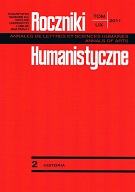Biskupi uniccy wobec reform kalendarza w drugiej połowie XVIII wieku
The Uniate Bishops' Attitude Towards the Calendar Reforms in the Second Half of the 18th Century
Author(s): Dorota WeredaSubject(s): History
Published by: Towarzystwo Naukowe KUL & Katolicki Uniwersytet Lubelski Jana Pawła II
Keywords: the Uniate Church in the 18th century; reforms of the calendar; Uniate bishops in the 18th century; reduction of holidays; liturgical calendar of the Uniate Church
Summary/Abstract: The provisions of the Union of Brest guaranteed the use of the Julian calendar in the Uniate Church. In the second half of the 18th century, as result of the social-political changes and of the so-called reduction of holidays in the Latin Church the issue of a reform of the calendar was brought up in the circle of the Uniate Church hierarchs. Work on it and debates showed that the calendar was clearly considered to be a element identifying all the faithful and an important factor creating a sense of separateness and of one’s identity in the multi-confessional and multinational Republic of Poland. The issue of a reform of the calendar used by the Uniate Church was raised in the forum of the Great Sejm, but a new list of holidays was compiled by Uniate bishops during the congress held in Warsaw on 17th September 1790. The hierarchy of the Uniate Church also had to take a position on the changes in the calendar introduced by the invader countries. The actions taken by Uniate hierarchs in the 18th century are an illustration of the attempt to unite and combine economic reasons with religious and social influences dictated by the ideas of the Enlightenment.
Journal: Roczniki Humanistyczne
- Issue Year: 59/2011
- Issue No: 02
- Page Range: 147-169
- Page Count: 23
- Language: Polish

